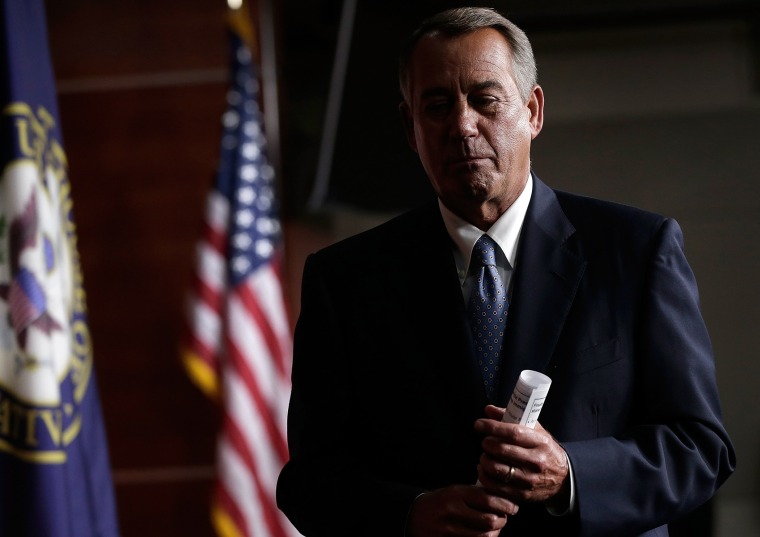[A]mong elected Republicans, and particularly GOP leaders, "repeal" has become a purely rhetorical posture. Since the end of the government shutdown fight, House Republicans have taken zero repeal, defund, or delay votes. The one bill it has passed -- the Keep Your Health Plan Act -- wasn't intended to be constructive. It was a poison pill. But it was also a strategic blunder, and as a policy proposal it fell far, far short of past attempts to gut the law. Now that it's December, Republicans are facing accelerating enrollment across the country and a thinning calendar. Healthcare.gov is much improved and still improving, and the House is set to adjourn on December 13 for the remainder of the year. When it returns, the hundreds of thousands of people who've already successfully enrolled will actually be insured, and their ranks will be swelling.
The repeal crusade dies with a whimper
The right doesn't want to hear this, but with each passing day, it becomes more obvious that the crusade to repeal "Obamacare" is over.

Two weeks ago, a House Republican playbook leaked, sketching out the GOP's plans for a "multilayered, sequenced assault" against the Affordable Care Act. To that end, House Republicans have scheduled four hearings this week -- three on Wednesday, one on Friday -- to complain about the reform law they love to hate.
What the Republican majority in the lower chamber has not done, however, is schedule a 47th "repeal Obamacare" vote. Why not? Because as Brian Beutler explained this morning, the repeal crusade has effectively burned itself out.
Quite right. In October, during a disastrous enrollment period, about 100,000 Americans signed up for coverage through exchange marketplaces, and an additional 400,000 took advantage of Medicaid expansion. We don't yet have the numbers for November, but preliminary evidence suggests 100,000 consumers enrolled last month through the federal exchange alone -- roughly quadruple the number from the month before -- and this doesn't include the state exchanges or Medicaid.
In other words, the political world is in the midst of a transition as it relates to the Affordable Care Act. Republicans spent much of 2013 fighting to take away Americans' health care benefits, but it was something of an abstraction -- they were benefits consumers were poised to receive but did not yet have. Next month, they're an abstraction no more -- families will have coverage they previously lacked, and well over 1 million Americans will have insurance they would otherwise lack.
It's exactly what makes a repeal vote more dangerous than at any previous point. There's a profound difference between "Republicans are voting to deny you a benefit you don't yet enjoy" and "Republicans are voting to take away your health insurance and replace it with nothing."
The former struck GOP officials as plausible; the latter is politically suicidal. The right doesn't want to hear this, but the repeal push effectively died on Election Day 2012. It's taken a year for the news to settle in among Republicans, but the fact remains that the law isn't going anywhere. With each passing day, more Americans enroll, and the law has another constituent that won't tolerate going backwards.
I don't doubt that there will be some candidates pushing the idea in next year's midterms, but there's no reason voters should take their nonsense seriously.